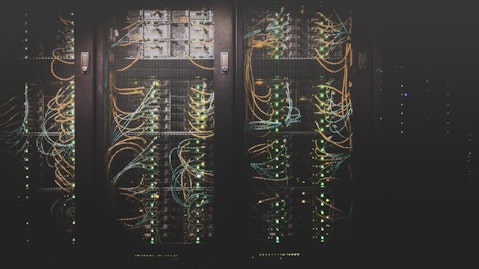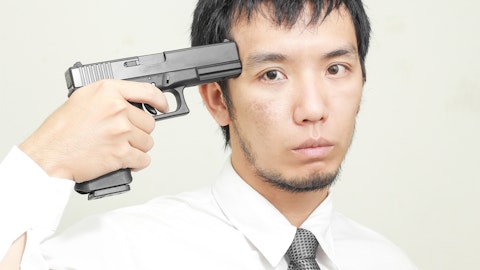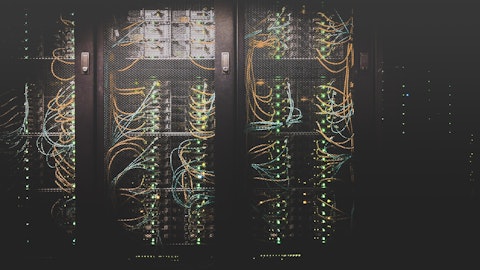In this article, we will be taking a look at the 20 countries that censor the Internet and banned social media. To skip our detailed analysis, you can go directly to see the 5 countries that censor the Internet and banned social media.
Currently, life can barely be imagined without Internet, which has permeated ever faucet of our existence, and internet access has become a basic human right or requirement in most countries, and currently, more than 63% of the population or over 5 billion people can access the internet across the world. However, unfortunately, this access is not uniform across the world and the countries with the highest internet penetration rates in 2023 have a penetration rate of at least 90% while the penetration rate in countries with the lowest internet penetration rates in 2023 doesn’t even exceed 25%.

Photo by Taylor Vick on Unsplash
However, internet access is entirely different to full and free internet access, as the latter is often not available even in countries where a majority of the population can access the internet. This is especially true in countries where authoritarian governments are established as opposed to democracies, as the former enact a higher form of censorship, often to ensure that all information is not available to the public, especially when such information would be damaging to their reign. Currently, the countries that censor the internet and banned social media impose moderate to severe bans especially on social media sites, as with the advent of social media, information has never been as fast or easily accessible as ever before. At the same time, false or misleading information has also never been as easily available, all of which has had a major impact on social media companies. While many of the countries that censor the internet and ban social media cite misinformation as one of the reasons for doing this, generally the actual reasons are more nefarious in nature, and global internet freedom is continuing to decline.
China is one of the countries with the highest levels of censorship on social media and on the internet in general, which has a negative impact on global growth for some of the most valuable social media companies in the world, especially since famous social media platforms including Facebook and Instagram owned by Meta Platforms, Inc. (NASDAQ:META), Snapchat owned by Snap Inc. (NYSE:SNAP) and Google and YouTube, owned by Alphabet Inc. (NASDAQ:GOOG), are all banned there. While Facebook initially used to operate in China, it was banned in 2009 after the Urumqi riots, with the Chinese government claiming that activists used the platform to organize and communicate during the riots. Because of this, WeChat has grown to be one of the top social media companies in the world, though on the other hand, this has led to revenue losses from the biggest market in the world by far. Despite this, Facebook still earns billions in revenue from China by selling ad space to government agencies and Chinese businesses, and in 2018, Facebook earned between $5 to $7 billion thanks to Chinese advertisers, which equated to nearly 10% of its total revenue. Even in 2023, part of Meta’s ad revenue growth has been attributable to China, with the company stating in its Q2 2023 earnings transcript “Online commerce benefited from strong span among advertisers in China, reaching customers in other markets. On a user geography basis, ad revenue growth was strongest in Rest of World at 16%, followed by Europe, North-America and Asia-Pacific at 14%, 11% and 10%, respectively. Foreign currency was a headwind to advertising revenue growth in all international regions.”
On the other hand, there is a difference between countries with the highest censorship and social media bans and countries which work to limit misinformation, which as we mentioned, is a major concern. This became a global issue after the 2016 elections when Facebook was accused of not doing enough to prevent misinformation which was said to play a major role in the election outcome. Before the elections, a major algorithm change implemented by Facebook resulted in users being directed to more feeds pertaining to friends and family, thus reducing the reach of reputable news publishers, which allowed misinformation to spread unfiltered. Post the elections, Facebook implemented another major change in its algorithm in 2018, and has also hired additional content reviewers, which number around 15,000 currently, out of a total team of 30,000 responsible for safety on Facebook, which in turn has resulted in an increase in costs, and hence lower margins.
Similarly, Google is also said to have made several changes to its algorithm in a bid to show more relevant and higher quality content. However, the search engine has then been accused of simply giving much more relevance to larger websites rather than simply focusing on websites which actually deliver the best quality, which has adversely impacted revenue for smaller websites and made it much harder to gain traction. This has also resulted in accusations that quality of Google search results have arguably declined, and givien a competitive advantage to other search engines such as Bing, which Microsoft Corporation (NASDAQ:MSFT) has paired with ChatGPT, gaining users ever since. Microsoft Corporation (NASDAQ:MSFT) mentioned this in its Q2 2023 earnings call, stating “Bing continues to gain share in the United States, and daily users of our Start personalized content feed increased over 30% year over year. We are now empowering retailers and expanding our third-party inventory. With PromoteIQ, we are building a complete omnichannel media platform for companies like the Australian retailer, Endeavor, as well as Canada’s Hudson’s Bay and Global, the largest Brazilian TV broadcasters chose Xandr to launch a new media buying platform in that market.” Forbes also mentioned the impact of pairing ChatGPT with Bing, stating that after the announcement, downloads peaked at 150,000 per day and while the tech is still in its infancy because of which costs are high as is the potential for errors, this could revolutionize the search engine industry by providing the highest quality and most relevant information, and could impede on Google’s absolute dominance of the search engine market.
Methodology
To determine the countries that censor the internet and ban social media, we headed over to Freedom House where we obtained data on the organization’s ranking of each country based on internet freedom. However, the rankings also involved internet access levels which we did not consider as those criteria are not relevant to censorship. We considered all criteria including government and national regulatory authorities interference in internet access, and ranked each country based on the average of its ranking for each separate criteria, which was then used to calculate the overall score, with countries being ranked from highest score to lowest (lowest indicates the least level of internet freedom).
20. Rwanda
Insider Monkey internet freedom score: 28
Rwanda’s government, like most governments in our list, have continued to impose internet restrictions and tighten control, with extra authoritarian steps such as requiring YouTube channels to register with the Rwanda Media Commission thankfully being abandoned for now.
19. Thailand
Insider Monkey internet freedom score: 27
While initially Thailand’s internet censorship policies focused on pornographic websites, internet censorship has continued to increase in the country in the last 15 years, with tens of thousands of websites continuing to be blocked in the country.
18. Venezuela
Insider Monkey internet freedom score: 25
Because of harsh laws in the country regarding internet posts, Venezuelans often self-censor themselves, while increasingly authoritative behavior from the government has seen internet freedom continue to decline.
17. Sudan
Insider Monkey internet freedom score: 25
While Sudan had been slowly improving in terms of internet freedom, the 2021 coup in the country resulted in further restrictions on the internet, and anti-coup protests resulted in nationwide restrictions on the internet.
16. Turkiye
Insider Monkey internet freedom score: 23
While some countries continue to improve in terms of internet censorship, Turkiye is going the other way as internet freedom is still declining. The Social Media Law passed in 2020 has continued to be used to make social media platforms remove content while thousands of people have been facing criminal charges for their social media posts.
15. Ethiopia
Insider Monkey internet freedom score: 23
In March 2023, Amnesty International called out Ethiopia after select social media sites were banned in the country for over a month, after tensions resulting from a disagreement in the Orthodox Church of Ethiopia.
14. Uzbekistan
Insider Monkey internet freedom score: 21
While internet restrictions are lessening slightly in Uzbekistan, a lot more still needs to be done in order to ensure Uzbekistan isn’t counted in this list.
13. Pakistan
Insider Monkey internet freedom score: 21
The Pakistani government and military are both to blame for Pakistan being among the countries censoring the internet and blocking social media. The country has blocked YouTube multiple times, including for a few years from 2012 to 2016 after an anti-Islam film was aired on YouTube. Recently, after major protests against the military, mobile internet was blocked for a few days as well.
12. Kazakhstan
Insider Monkey internet freedom score: 20
Kazakhstan has often resorted to blocking internet access or shutting off the internet for the entire country when deemed beneficial for the government, including on January 5 2022, in an attempt to quell any civil unrest.
11. Belarus
Insider Monkey internet freedom score: 20
One of the few European countries which censors the internet and blocks social media apps, Belarus has required all media outlets to register with the government or otherwise be blocked. Many independent publications have to use foreign based internet domain in order to escape the ire of the Belarusian government.
10. United Arab Emirates
Insider Monkey internet freedom score: 19
While the UAE has provided high speed internet access to almost all of its citizens, many social media apps such as WhatsApp remain banned in the country, while like most Muslim countries, pornography websites are also completely banned.
9. Egypt
Insider Monkey internet freedom score: 19
Internet censorship in Egypt increased after the El-Sisi regime began, and high levels of surveillance, in addition to harsh criminal penalties have led to higher censorship in the country.
8. Cuba
Insider Monkey internet freedom score: 17
While the Cuban government itself imposes internet restrictions, another reason why it’s among the countries that censor the internet and block social media apps is because of U.S. sanctions, which also make it difficult to access various platforms and websites.
7. Bahrain
Insider Monkey internet freedom score: 17
Despite Bahrain being among the countries with the highest internet penetration rates in the world, most countries in the Middle East heavily censoring content and carrying out strict monitoring of social media, and Bahrain is included in this list.
6. Vietnam
Insider Monkey internet freedom score: 14
Vietnam significantly imposes restrictions and limitations on internet content in the country, though it has improved somewhat by ending its throttling of Facebook servers. Further, harsh sentences are imposed on those engaging in online expression which isn’t approved by the government.
Click to continue reading and see 5 countries that censor the internet and banned social media.
Suggested Articles:
- 18 Biggest Generative AI Companies In The World
- 12 States With The Largest Refining Capacity
- 20 Countries with Highest Rates of Hair Loss
Disclosure: None. 20 countries that censor the internet and banned social media is originally published on Insider Monkey.





